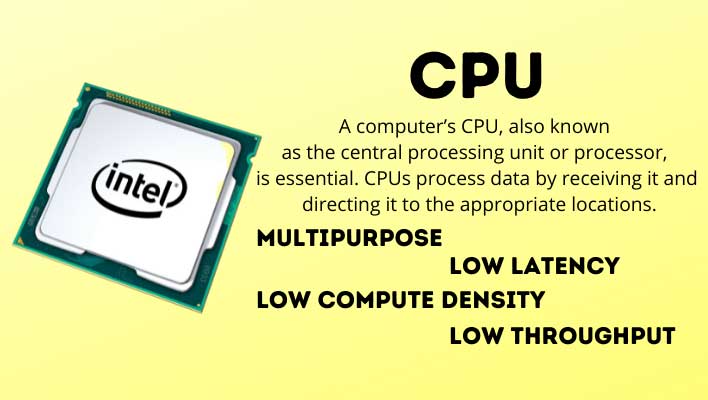What would be the difference between an APU vs CPU vs GPU? What would be better? How do they differ, and what are their advantages?
The CPU is the brain of a computer, so it controls all the other computer components. APUs are AMD’s version of a CPU and GPU hybrid that can perform both tasks while being energy and cost-efficient, though not as powerful. Computing and rendering are handled by the GPU.
Unlike the CPU, an APU is equipped with a GPU as well. In addition, the majority of APUs support only PCIe x8 rather than x16. The slot and APU split the channels accordingly. Nevertheless, this may not affect graphics card performance at all.
What Is A CPU?
A computer’s CPU, also known as the central processing unit or processor, is essential. CPUs process data by receiving it and directing it to the appropriate locations. Instructions are sent by computer software and are executed by the CPU.
CPUs with more cores and threads will be able to handle more tasks at the same time, making them more productive. The faster the clock speed of a CPU, the more quickly its processing tasks are completed.
In general, these factors make the CPU’s capacity to handle data more significant, resulting in a smoother overall user experience. If you want to buy a High-Performance Home Server CPU then you must need to review our Post.
What Is An APU?
APU (Accelerated Processing Unit) are CPUs from AMD with integrated graphics chips. Many Intel CPUs come with integrated graphics, which can cause confusion. Integrated graphics are, however, only found in AMD APUs.
An APU is the best combination of a CPU and a GPU in a single processor. Intel’s integrated chips did not provide the same graphical experience as AMD’s GPU architecture.
What Is A GPU?
GPUs, or Graphics Processing Units, are one of the fundamental components of gaming computers. More frames will be displayed every second if your video card is faster.
Games require a graphics card with higher resolution since they are visually demanding.
Video cards are usually the most expensive part of gaming builds, making them a daunting task for gamers on a tight budget. Gaming performance is not always the best with cheap video cards.
Which Is Better: CPU vs APU vs GPU?
If APU stood for Advanced Processing Unit, you would have thought that APUs would have a performance edge over discrete processors & GPUs, but they don’t.
Depending on the circumstances, the answer will vary. I believe a CPU and dedicated graphics card combo is preferable to an APU for the vast majority of users.
When it comes to gaming computers, APUs are a great way to bring two birds together with one stone if you don’t want to spend a lot of money on a new one.
In the end, APUs will never be an ideal choice for gamers. The high-resolution gaming capabilities of dedicated GPUs enable higher-resolution gaming while eliminating the burden on the CPU.
Commonly asked questions
Is APU better than CPU and GPU?
An APU, or Accelerated Processing Unit, is a type of microprocessor that combines a CPU and a GPU on a single chip. This allows for better performance and energy efficiency compared to using separate CPU and GPU chips.
The advantages of an APU over a CPU and GPU combination include:
- Lower power consumption: An APU consumes less power than a CPU and GPU combination, as it eliminates the need to transfer data between the CPU and GPU over a separate bus.
- Space savings: An APU takes up less space than a CPU and GPU combination, as it combines the two components into a single chip.
- Improved performance: An APU can improve performance in some scenarios, as the CPU and GPU can work together more efficiently.
However, it’s important to note that APUs tend to be less powerful than a standalone CPU and GPU combination, especially on the high end. So if you are looking for a high-performance server or gaming setup, a standalone CPU and GPU combination may be a better choice.
In general, whether an APU is better than a CPU and GPU combination will depend on the specific use case and the workload the system will be handling. It’s best to consult with a professional or refer to the system’s specifications to determine the appropriate choice for your needs.
Will APU replace GPU?
APUs, or Accelerated Processing Units, have the ability to handle some of the tasks that are typically handled by a GPU, but it is unlikely that APUs will replace GPUs entirely.
APUs combine a CPU and GPU on a single chip, which can improve performance and energy efficiency in some scenarios. However, the GPU component of an APU is typically less powerful than a standalone GPU, and may not be suitable for demanding tasks such as high-performance gaming or professional 3D rendering.
On the other hand, GPUs are specialized in handling highly parallel workloads such as video rendering, machine learning and gaming. They also have more CUDA cores, which are specialized processors for handling certain types of graphics and computation tasks.
Additionally, GPU technology is advancing rapidly, and many new features such as ray tracing and AI-accelerated computation are being added to GPUs that are not available in APUs yet.
It’s likely that APUs will continue to be used in some scenarios, such as embedded systems or low-power devices, but they are unlikely to replace standalone GPUs for high-performance tasks.
It’s worth noting that, as technology advances, the line between CPU and GPU is becoming more blurred, and it’s possible that APUs will become more powerful in the future and will become suitable for more demanding workloads.
Is APU enough for gaming?
An APU, or Accelerated Processing Unit, which combines a CPU and a GPU on a single chip, can be enough for some types of gaming, but it may not be suitable for all types of games or for high-performance gaming.
For most casual or less demanding games, an APU should be capable of providing good performance. However, for more demanding games or for high-performance gaming, an APU may not provide the same level of performance as a standalone GPU. APU’s GPU component is typically less powerful than a standalone GPU, and may not be suitable for demanding tasks such as high-resolution gaming or running games at high frame rates.
It’s also worth noting that game developers may optimize their games for standalone GPUs, which may not provide the best performance on an APU.
Additionally, the gaming industry is advancing rapidly, and new features such as ray tracing and AI-accelerated computation are being added to games that are not available on APUs yet.
In general, whether an APU is enough for gaming will depend on the specific games being played and the desired level of performance. For casual gaming or less demanding games, an APU should be capable of providing good performance, but for more demanding games or high-performance gaming, a standalone GPU may be necessary.
Is CPU or GPU better for gaming?
Both the CPU and GPU play important roles in gaming and the choice of which one is better for gaming will depend on the specific needs and desired performance level.
The CPU, or Central Processing Unit, is responsible for processing the game’s instructions and performing tasks such as physics calculations and artificial intelligence. A high-performance CPU can help ensure that the game runs smoothly and that the game’s characters and environments are rendered correctly.
On the other hand, the GPU, or Graphics Processing Unit, is responsible for rendering the game’s graphics and handling tasks such as shading and lighting. A high-performance GPU can help ensure that the game’s graphics are rendered in high resolution and at high frame rates.
In general, a balance of both CPU and GPU is important for optimal gaming performance. A powerful CPU can help ensure that the game runs smoothly, while a powerful GPU can help ensure that the game’s graphics are rendered in high resolution and at high frame rates.
Do games rely on CPU or GPU?
Both the CPU and GPU play important roles in gaming, and different games may place different demands on each component.
The CPU, or Central Processing Unit, is responsible for processing the game’s instructions and performing tasks such as physics calculations, artificial intelligence, and game logic. A high-performance CPU can help ensure that the game runs smoothly, with a good frame rate and low input lag.
On the other hand, the GPU, or Graphics Processing Unit, is responsible for rendering the game’s graphics and handling tasks such as shading, lighting, and post-processing. A high-performance GPU can help ensure that the game’s graphics are rendered in high resolution and at high frame rates.
Does CPU really matter for gaming?
The CPU, or Central Processing Unit, is an important component in a gaming PC and can affect the performance of games in several ways. A high-performance CPU can help ensure that the game runs smoothly, with a good frame rate and low input lag.
A powerful CPU can help ensure that the game’s instructions are processed quickly and efficiently, which can help ensure that the game runs smoothly, with a good frame rate and low input lag. This is particularly important for games that have a lot of physics calculations, such as simulations or first-person shooters, as these games can place a lot of demands on the CPU.
Additionally, a powerful CPU can also help ensure that the game’s artificial intelligence and game logic runs smoothly, which can help ensure that the game’s characters and environments are rendered correctly.
However, it’s worth noting that the GPU, or Graphics Processing Unit, is also an important component in a gaming PC and can affect the performance of games in several ways. A high-performance GPU can help ensure that the game’s graphics are rendered in high resolution and at high frame rates.
Conclusion
It has been demonstrated that APUs are more powerful than CPUs because they incorporate both CPUs and GPUs into one unit. The integrated GPU means you do not need to buy a separate graphics card to make it work, so it usually has slightly less power than the equivalent CPU. APUs are also more energy-efficient. Because AMD APUs contain Radeon GPUs, they are more powerful than Intel’s integrated HD graphics.
In cases where you do not intend to purchase a graphics card and are only using your computer for basic tasks, or if you do not have the money to buy one now, you should consider getting an APU, combining a CPU and a dedicated graphics card is usually the best option for performance and value.







